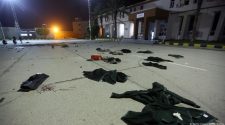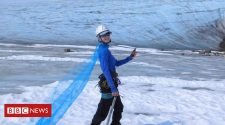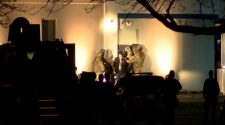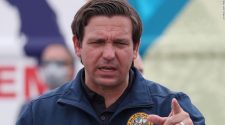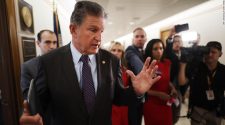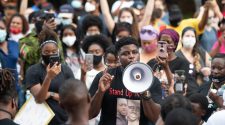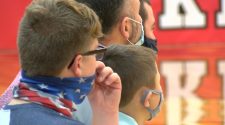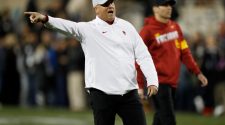Two McDonald’s in Hawaii linked to a dozen coronavirus cases
Hawaii officials said Tuesday a cluster of 12 COVID-19 cases had been linked to two McDonald’s locations in Kailua Kona, a town on the Big Island. The state Health Department said seven workers and five of their family members had tested positive for COVID-19.
Officials said they don’t believe any customers were affected.
The eateries are in a mall and inside a Walmart. Both have been closed for a deep cleaning but their owner said workers had been wearing protective gear and following proper social distancing protocols to protect customers. Click here to read more.
Senior EU diplomat says “no reason justifying” Trump’s decision to halt WHO funding
A senior European Union official joined the growing chorus of condemnation Wednesday of President Trump’s decision to halt U.S. funding for the World Health Organization.
EU High Representative for Foreign Affairs and Security Policy Josep Borrell Fontelles said there was “no reason justifying this move at a moment when their [WHO’s] efforts are needed more than ever to help contain & mitigate the #coronavirus pandemic.”
Moscow digital travel permit system meant to curb COVID-19 leads to dangerous crowding
The first day of Moscow’s new digital travel permit system, meant to limit the spread of the coronavirus, brought traffic jams and crowds of people outside subway stations, raising criticism and health concerns. Moscow has been hit hardest by Russia’s COVID-19 outbreak, which by Wednesday had seen almost 24,500 confirmed cases.
This week the government mandated travel permits for all people using public or private transport in the Moscow region in a bid to enforce a nationwide lockdown. The Kremlin has ordered all non-essential business closed until the end of the month, and all non-essential workers are only allowed to leave their homes to walk their dogs, get groceries nearby or visit pharmacies or doctors offices.
But on Wednesday morning, photos and videos posted to social media showed scores of people standing close to each other outside subway entrances as they waited for their newly-required permits to be checked by security officers.
“Those who are not sick yet will definitely get sick now,” one commuter said on Twitter, with a photo of a long line.
On the roads, traffic police were checking all cars driving into the city, causing massive traffic jams at nearly all entryways to the capital.
Moscow Mayor Sergei Sobyanin blamed the lines on the police, and promised to work out an automated system to check travelers’ permits.
Russia says U.S. should “refrain from further attacks” on WHO, stop finding “someone to blame”
Russian Deputy Foreign Minister Sergei Ryabkov on Wednesday defended the World Health Organization as a respected global body, a day after President Trump blamed the U.N. agency for the dizzying death toll caused by the new coronavirus and accused it of mishandling the world response to the crisis.
“We are calling on the U.S. to refrain from further attacks on the WHO and pursue a responsible policy, which would not ruin the basis of international cooperation in the medical and biological field, but on the contrary would enhance this cooperation and create a basis for its further development,” Ryabkov said, according to Russia’s TASS news agency.
Russian officials said the decision by Mr. Trump showed the White House’s priority was to scapegoat other institutions as the U.S. grapples with the world’s deadliest COVID-19 outbreak.
“Politicians in that country always have someone to blame,” Foreign Ministry Spokeswoman Maria Zakharova told TASS. “The most important thing is to find a fictitious ‘test tube’ and present it to the world as evidence of the guilt of others, and its own flawlessness.”
Germany slams Trump’s WHO payment freeze
Germany slammed Wednesday the U.S. decision to suspend payments to the World Health Organization (WHO), as Foreign Minister Heiko Maas warned against “blaming others” for the coronavirus crisis.
“Blaming others won’t help. The virus knows no borders,” Maas wrote on Twitter. “One of the best investments is to strengthen the UN, above all the under-financed WHO… in the development and distribution of tests and vaccines.”
The United States is the biggest contributor to the WHO, making payments of $400 million last year. Mr. Trump accused the Geneva-based body of putting “political correctness above life-saving measures.”
The move sparked criticism across the world, and Maas joined the chorus on Wednesday, stressing the need for countries to “work together closely against COVID-19.”
Maas has previously taken aim at the Trump administration’s reaction to the virus crisis. In an interview with Der Spiegel magazine last week, he said the United States had “played down the virus for a very long time.”
“There really isn’t any dispute, even in the USA, that many of the measures were taken too late,” he told Spiegel.
– AFP
India to start easing some lockdown measures in 5 days in bid to salvage its economy
A day after Indian Prime Minister Narendra Modi extended the nationwide lockdown aimed at curbing the coronavirus until May 3, his government has announced plans to relax the measures in some areas less affected by the COVID-19 disease in a bid to revive the failing economy.
The government said that in rural areas where the virus is slowing, from April 20 all farm activity and construction work, and some industry, would be allowed to resume. The inter-state transport of goods and e-commerce would also be allowed to resume throughout the country to help maintain supply chains for food and essential items.
However, in “hotspots” and “red zones” — areas where a high number of coronavirus cases have been found — no economic activity will be permitted to restart yet. India has reported nearly 11,500 cases of COVID-19 and 377 deaths.
The relaxation of the lockdown measures will help some of the 450 million members of the nation’s informal workforce, most of whom have been out of work since the lockdown began on March 25, find work again.
Bill Gates calls Trump’s decision to withhold WHO funding “as dangerous as it sounds”
Billionaire philanthropist and Microsoft co-founder Bill Gates has said President Trump’s decision to suspend hundreds of millions of dollars of U.S. funding for the World Health Organization in the midst of a global coronavirus pandemic “is as dangerous as it sounds.”
Gates has been warning about the threat of a global pandemic since 2015 and has committed $100 million to fight the coronavirus through the Bill and Melinda Gates Foundation.
Mr. Trump announced the halt in U.S. funding Tuesday, accusing the U.N. health agency of deliberately misleading the world about the gravity of the COVID-19 outbreak in China and blaming it for the high death tolls around the world.
In a tweet sent hours later, Gates said the WHO’s “work is slowing the spread of COVID-19 and if that work is stopped no other organization can replace them. The world needs @WHO now more than ever.”
Search for vaccine heats up in U.S. and China
Three potential COVID-19 vaccines are making fast progress in early-stage testing in volunteers in China and the U.S., but it’s still a long road to prove if they’ll really work.
China’s CanSino Biologics has begun the second phase of testing its vaccine candidate, China’s Ministry of Science and Technology said Tuesday.
In the U.S., a shot made by the National Institutes of Health and Moderna Inc. isn’t far behind. The first person to receive that experimental vaccine last month returned to a Seattle clinic Tuesday for a second dose. NIH infectious disease chief Dr. Anthony Fauci told The Associated Press there are “no red flags” so far and he hoped the next, larger phase of testing could begin around June.
A third candidate, from Inovio Pharmaceuticals, began giving experimental shots for first-step safety testing last week in the U.S. and hopes to expand its studies to China.
South Koreans vote in national elections amid virus fears
South Korean voters are wearing masks and moving slowly between lines of tape at polling stations to elect lawmakers in the shadows of the coronavirus.
The government has resisted calls to postpone the parliamentary elections billed as a midterm referendum for President Moon Jae-in. He enters the final years of his term grappling with a historic public health crisis that is unleashing massive economic shock.
South Koreans are deeply divided along ideological and generational lines and regional loyalties. But recent surveys showed support for Moon and his liberal party, reflecting the public’s approval of an aggressive test-and-quarantine program so far credited for lower fatality rates compared to areas worse hit by the virus.
U.N. chief speaks out after Trump halts U.S. funding for WHO: “Now is the time for unity”
United Nations Secretary-General António Guterres urged unity among world powers Tuesday, hours after President Trump said he would halt funding for the World Health Organization.
Guterres reiterated a statement he made on April 8, in which he wrote, “Once we have finally turned the page on this epidemic, there must be a time to look back fully to understand how such a disease emerged and spread its devastation so quickly across the globe, and how all those involved reacted to the crisis. The lessons learned will be essential to effectively address similar challenges, as they may arise in the future. But now is not that time.”
“It is not that time,” he stressed on Tuesday. “It is also not the time to reduce the resources for the operations of the World Health Organization or any other humanitarian organization in the fight against the virus.”
“As I have said before, now is the time for unity and for the international community to work together in solidarity to stop this virus and its shattering consequences,” Guterres said.


